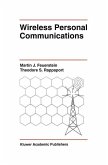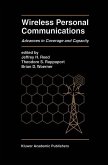In this book, the state-of-the-art and future vision of wireless communications is presented in the form of a number of new services. Wireless personal communications is clearly a different service than today's cellular radio or cordless telephone, but there is an evolutionary connection between the three services. This book addresses questions about what features of personal communication services (PCS) will be met by existing or enhanced digital cellular radio technology. The regulatory and standards aspects of wireless communications are currently in a crucial stage of their formulation. A section of the book is devoted to the opinions of representatives from regulatory agencies and standards organizations on the future of this critical area.
One of the most intriguing questions about the future of wireless communications has to do with the choice of multiple access technique. The trade offs between time division multiple access (TDMA) and code division multiple access (CDMA) have been the topic of many a heated discussion amongst members of the wireless community. This book presents a thorough discussion of a number of the topics which are instrumental in making a fair comparison of TDMA and CDMA; these topics include: analytical performance evaluation techniques, capacity studies, equalization requirements, and shared spectrum comparisons.
Many of the technologies associated with wireless personal communications are reaching the design stages. This book presents a number of alternatives for designs of both base stations and user terminals. Some of the key questions of equalization, control channel requirements, multi-path diversity and channel allocation strategies have been addressed. Invariably, system designs and performance are tied to the characteristics of the radio channel. This book introduces several novel techniques for predicting propagation and system performance in a variety of indoor and outdoor environments. These techniques include analytical as well as computer simulation algorithms for predicting signal strenghts and other channel parameters based on the local topographical features.
This book serves as an excellent reference source and may be used as a text for advanced courses on wireless communications, cellular radio, or digital mobile radio.
One of the most intriguing questions about the future of wireless communications has to do with the choice of multiple access technique. The trade offs between time division multiple access (TDMA) and code division multiple access (CDMA) have been the topic of many a heated discussion amongst members of the wireless community. This book presents a thorough discussion of a number of the topics which are instrumental in making a fair comparison of TDMA and CDMA; these topics include: analytical performance evaluation techniques, capacity studies, equalization requirements, and shared spectrum comparisons.
Many of the technologies associated with wireless personal communications are reaching the design stages. This book presents a number of alternatives for designs of both base stations and user terminals. Some of the key questions of equalization, control channel requirements, multi-path diversity and channel allocation strategies have been addressed. Invariably, system designs and performance are tied to the characteristics of the radio channel. This book introduces several novel techniques for predicting propagation and system performance in a variety of indoor and outdoor environments. These techniques include analytical as well as computer simulation algorithms for predicting signal strenghts and other channel parameters based on the local topographical features.
This book serves as an excellent reference source and may be used as a text for advanced courses on wireless communications, cellular radio, or digital mobile radio.






